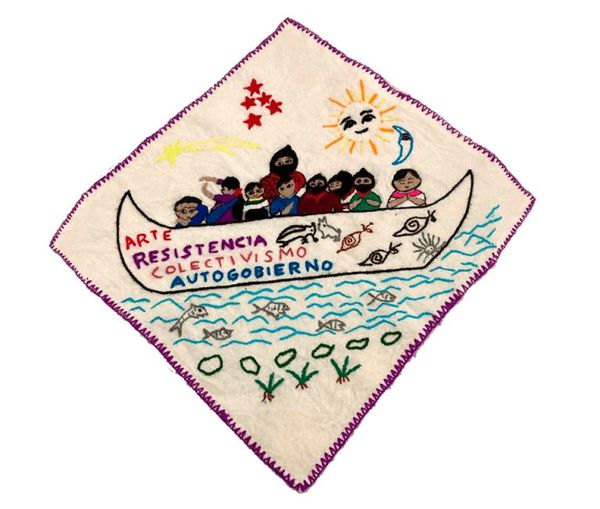
By: Luis Hernández Navarro
In July, August, September and October of this year, a delegation of the Mexico below will travel to Europe. The EZLN, the National Indigenous Congress-Indigenous Government Council and the Peoples Front in Defense of Water and Land of Morelos, Puebla and Tlaxcala (hereafter, the Frente) make up the delegation. The initiative forms part of a wider tour that will travel, later, to Asia, Africa, Oceania and America.
The group will hold meetings, dialogues, exchange ideas, experiences, analysis and evaluations in the struggle for life. It will seek to know what’s different. Those who will meet share the understanding that the executioner of humanity is “an exploitive, patriarchal, pyramidal, racist, thieving and criminal system: capitalism” (https://bit.ly/2XmkIhN).
The Declaration for life that accompanies the mission was signed by hundreds of collectives, associations that struggle, personalities and activists in a multitude of countries that form an anti-neoliberal and anti-capitalist galaxy, crossed in different ways by Zapatismo. The International United Left greeted the expedition fraternally.
We’re clearly dealing with an initiative of the left, if we understand by that the definition given by the Austrian-French philosopher and journalist André Gorz. “Being left –he affirms– means feeling linked to all those who struggle for their own liberation, who don’t accept without more the determination from above of goals and objectives and who struggle, together or alone, for the elimination of all forms of domination and for the overthrow of all power apparatus of power.”
The European tour will take place at a time of an enormous confusion, uncertainty, chaos and insecurity throughout the world. The future is no longer what it was and it isn’t clear how it’s going to be.
The rebel journey will take place in a world shaken, among other things, by the intersection of the health and economic crisis precipitated by the coronavirus pandemic, by the growing hegemony of digital capitalism in the process of global re-composition of this economic system, by the emergence of a new and timid Latin American progressivism articulated around the Group of Puebla, which appears to want to dispense with the influence of Cuba and Venezuela in the region, by the electoral defeat of Trumpism and its State self-coup, by the advance of the extreme right, racism and xenophobia in many European countries and/or by the growing rapprochement of China and Russia.
But it’s also because of the deployment of many resistance struggles, such as the one carried out in Greece by the tireless protests of grassroots collectives that forced justice of that nation to sentence the fascist party Golden Dawn (Amanecer Dorado) as a criminal organization and condemn some of its leaders to prison, or like the irruption on France of the yellow vest movement against the rise in the price of fuel, fiscal injustice and the loss of purchasing power, or the emergence of anti-fascist and anti-racist networks throughout the territory of the European Union that seek universal citizenship. There’s also the persistence of a powerful feminist mobilization.
To elaborate a vision about that old world that falls precipitously and the new one that emerges with great difficulties requires that it be lived, thought, analyzed, from the resistance struggles from below that make up the associative constellation in defense of life.
The European expedition should come as no surprise. In itself, many of the collectives that resist in Europe have accompanied the Zapatistas since 1994. Luca Casarini, an active participant for many years in the Italian Social Centers, said: “we have a dream. In that dream, we were born on January 1, 1994, at the side of the Zapatistas. The dream is good, and it’s not totally fanciful, but reality is different.”
That dream is not exclusive to Luca. Despite the years that have passed since the EZLN Uprising, many forces throughout Europe feel deeply identified with Zapatismo. A good number of them have played a key role in the movement of movements that confronted neoliberal globalization in the protests against the invasion and war in Iraq, in the fight against the fascist emergency, in the occupation of public squares, in the defense of migrants, in the struggle against evictions after the crisis of 2008 and a thousand and one more fights.
For more than 26 years, thousands of these activists have traveled regularly on solidarity missions to the rebel camps in Chiapas. The Mexican government deported dozens of them and prohibited them from returning to the country. They actively participated in the 1st Encuentro for Humanity and against Neoliberalism, convened by the EZLN in the Lacandón Jungle in 1996. The institutional left baptized them (with a hint of contempt) as aretudos (men who wear earrings), for the men’s fashion of wearing small earrings. Curiously, these “aretudos” championed a cycle of historic struggles around altermundismo (the belief that another world is possible) and renewed the European left from below.
The decision of the Zapatistas, the CNI-CIG and the Frente, to weigh anchor and sail to Europe, will thus be, a sort of return to meet with old friends to whom they have offered hospitality throughout two and a half decades. It’s an act of reciprocity to corroborate “the commitment to struggle everywhere and all the time,” until its destruction, against capitalism.
———————————————————–
Originally Published in Spanish by La Jornada
Tuesday, January 12, 2021
https://www.jornada.com.mx/2021/01/12/opinion/012a1pol
Re-Published with English interpretation by the Chiapas Support Committee